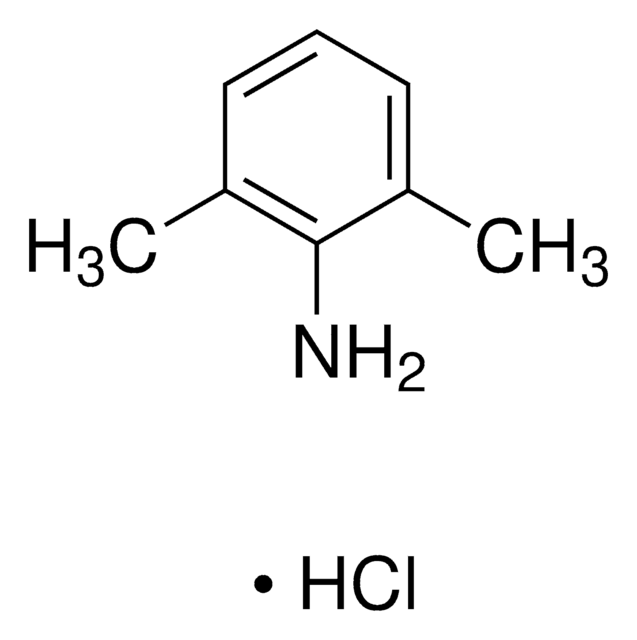442327
2,6-Dimethylaniline
analytical standard
Synonyme(s) :
2,6-Xylidine, 2-Amino-1,3-dimethylbenzene, 2-Amino-m-xylene
About This Item
Produits recommandés
Qualité
analytical standard
Niveau de qualité
Pression de vapeur
<0.01 mmHg ( 20 °C)
Pureté
>99% (GC)
CofA (certificat d'analyse)
current certificate can be downloaded
Conditionnement
ampule of 1000 mg
Technique(s)
HPLC: suitable
gas chromatography (GC): suitable
Indice de réfraction
n20/D 1.560 (lit.)
Point d'ébullition
214 °C/739 mmHg (lit.)
Pf
10-12 °C (lit.)
Densité
0.984 g/mL at 25 °C (lit.)
Application(s)
environmental
Format
neat
Température de stockage
2-30°C
Chaîne SMILES
Cc1cccc(C)c1N
InChI
1S/C8H11N/c1-6-4-3-5-7(2)8(6)9/h3-5H,9H2,1-2H3
Clé InChI
UFFBMTHBGFGIHF-UHFFFAOYSA-N
Vous recherchez des produits similaires ? Visite Guide de comparaison des produits
Description générale
Application
Mention d'avertissement
Warning
Mentions de danger
Classification des risques
Acute Tox. 4 Dermal - Acute Tox. 4 Inhalation - Acute Tox. 4 Oral - Aquatic Chronic 2 - Carc. 2 - Eye Irrit. 2 - Skin Irrit. 2 - STOT SE 3
Organes cibles
Respiratory system
Code de la classe de stockage
6.1A - Combustible acute toxic Cat. 1 and 2 / very toxic hazardous materials
Classe de danger pour l'eau (WGK)
WGK 3
Point d'éclair (°F)
195.8 °F - closed cup
Point d'éclair (°C)
91 °C - closed cup
Équipement de protection individuelle
Eyeshields, Faceshields, Gloves, type ABEK (EN14387) respirator filter
Faites votre choix parmi les versions les plus récentes :
Déjà en possession de ce produit ?
Retrouvez la documentation relative aux produits que vous avez récemment achetés dans la Bibliothèque de documents.
Les clients ont également consulté
Notre équipe de scientifiques dispose d'une expérience dans tous les secteurs de la recherche, notamment en sciences de la vie, science des matériaux, synthèse chimique, chromatographie, analyse et dans de nombreux autres domaines..
Contacter notre Service technique











